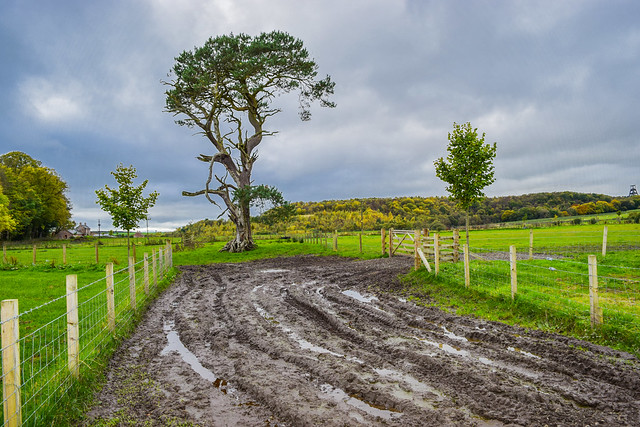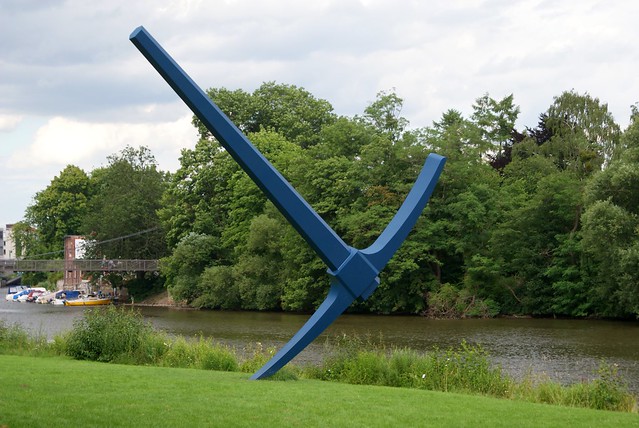Words for bucket, pail, pitcher and related things in Celtic languages.
Words marked with a * are reconstructions.
| Proto-Celtic | *kelɸurnos = pail, bucket, pitcher, pot, vat, vessel |
|---|---|
| Old Irish (Goídelc) | cilorn(n) = jug, pitcher |
| Middle Irish (Gaoidhealg) | cilorn(n), cilarn, culorn = pitcher, vessel |
| Irish (Gaeilge) | ciolarn = pitcher (literary) |
| Scottish Gaelic (Gàidhlig) | ciolarn, coilorn, ciolurn = milk pitcher with a handle out of its side, a hand-can |
| Manx (Gaelg) | curn = can, milk can curn jinnairagh = dinner can curn spreih = watering can curn tey = billy, tea caddy |
| Proto-Brythonic | *kelurn = pail, pitcher, bucket (?) |
| Old Welsh (Kembraec) | cilurnn = pail, pitcher, vessel, bucket, tub |
| Middle Welsh (Kymraec) | kelurn, kelwrn, celwrn = pail, pitcher, vessel, bucket, tub |
| Welsh (Cymraeg) | celwrn [ˈkelʊrn] = pail, pitcher, vessel, bucket, tub celwrn llaeth = milk-pail |
| Cornish (Kernewek) | kelorn = bucket, pail kelorn-godra = milking pail |
| Middle Breton (Brezonec) | quelorn = bucket |
| Breton (Brezhoneg) | kelorn [ˈkeːlɔrn] = bucket, tub, head kelorniad [keˈlɔr.njat] = bucket (of), contents of a bucket |
Etymology: unknown, probably a Wanderwort. Possibly related to Proto-Indo-European *kelp- (cauldron, jar) [source]. Words from the same roots include calpar (vessel for liquids, especially for wine, wine cask, wine picher), and Ancient Greek κάλπις (kálpis – jug urn) [source].
| Middle Breton (Brezonec) | saill = bucket, cylinder |
|---|---|
| Breton (Brezhoneg) | sailh [ˈsalj/ˈsaʎ] = bucket, cylinder sailhad = (cylinder) capacity, displacement |
Etymology: unknown [source].
| Irish (Gaeilge) | buicéad [ˈbˠʊceːd̪ˠ / ˈbˠʌkɔdʲ] = bucket |
|---|---|
| Scottish Gaelic (Gàidhlig) | bucaid [buxgadʲ] = bucket, dustbin bacaid [baxgadʲ] = pimple, pustule, bucket, dustbin bucaid-theine = fire bucket bucaideach [buxgɪdʲəx] = pertaining to or abounding in buckets, booming |
| Middle Welsh (Kymraec) | bwcket, bwcet = bucket |
| Welsh (Cymraeg) | bwced = bucket bwcedaf, bwcedu = to bucket bwcedaid = bucketful pwced = bucket |
| Cornish (Kernewek) | boket = bucket |
Etymology: from English bucket or Middle English buket, boket (bucket), from Anglo-Norman buket, buquet (tub, pail), a diminutive of Old French buc (abdomen), from Vulgar Latin *būcus, from Frankish *būk (belly, stomach), from Proto-Germanic *būkaz (belly, abdomen, body), from Proto-Indo-European *bʰōw-go-s, from *bʰew- (to swell, inflate); [source].
| Middle Irish (Gaoidhealg) | crúsca, crúisce = little jug, cruet |
|---|---|
| Irish (Gaeilge) | crúsca = jug, jar crúiscín = small jug, smal jar |
| Scottish Gaelic (Gàidhlig) | crùisg [kruːʃgʲ] = jug crùisgean = oil-lamp, small jug, pitcher |
| Manx (Gaelg) | cruick = bucket, pail cruick gheayil = scuttle cruick vlieaun = milking pail lane cruick = bucketful, pailful |
| Middle Welsh (Kymraec) | krwck = tub, pitcher, bucket, pail |
| Welsh (Cymraeg) | crwc = tub, pitcher, bucket, pail |
Etymology: possibly from English crock (a stoneware or earthenware jar or storage container) or from Middle English crok(ke) (crock, pot, cauldron, belly, stomach), from Old English crocc(a) (crock, pot, vessel), from Proto-Germanic *krukkō (vessel), from Proto-Indo-European *growg- (vessel). Related words include krukke (jar) in Danish, kruik (jar, jug) in Dutch, cruche (pitcher, jug) in French, and krukka (pot, jar) in Icelandic [source].
| Irish (Gaeilge) | pitséar = pitcher |
|---|---|
| Scottish Gaelic (Gàidhlig) | pidsear = pitcher |
| Middle Welsh (Kymraec) | pisser = pitcher, jug, can, (milk) pail piseret = a pitcherful |
| Welsh (Cymraeg) |
pis(i)er = pitcher, jug, can, (milk) pail piseraid = a pitcherful |
| Middle Cornish (Cernewec) | pycher = pitcher |
| Cornish (Kernewek) | pycher = pitcher |
| Middle Breton (Brezonec) | picher = pitcher |
| Breton (Brezhoneg) | picher = pitcher |
Etymology: probably from Middle English picher, and/or from Old French pichier, pechier (small jug), from Late/Medieval Latin pīcārium, alteration of bīcārium (drinking glass) possibly from bacarium, bacar (a type of wine glass), or from Ancient Greek βῖκος (bîkos – amphora) [source].
Sources: Wiktionary, Etymological Dictionary Of Proto Celtic, In Dúil Bélrai English – Old Irish glossary, eDIL – Electronic Dictionary of the Irish Language, Teanglann.ie, Am Faclair Beag, An etymological dictionary of the Gaelic language, Fockleyreen: Manx – English Dictionary, Online Manx Dictionary, Gaelg Corpus, Geiriadur Prifysgol Cymru, Lexicon cornu-britannicum : a dictionary of the ancient Celtic language of Cornwall, Gerlyver Kernewek, Devri : Le dictionaire diachronique du breton, Geriafurch, TermOfis






